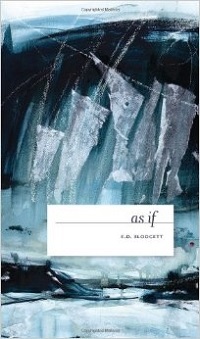
E. D. Blodgett. as if. Edmonton: U of Alberta P, 2014.
~Reviewed by Harold Rhenisch
Blodgett’s latest book in his Apostrophes series is two books in one. Both are contemplations of wisdom and identity. The first is a book of poetry—words laid down in measure, printed on paper. Its words are made of artful language. Listen:
how lightly over the earth
through seed time and all
harvest have the feet
of those who cannot be known
to us trodden in
their dance
Eliot did no better in The Four Quartets, which these dance steps echo.
The second book is an energy field, conjured by a reader reading that first book. Its words are not human language but the ghosts of the earth, conjured by human speech. They include (randomly), “pond,” “fish,” “ground,” “cat,” and “stars”—very basic Anglo-Saxon “things.” Blodgett conjures them within the imagery of Japanese woodblock prints and the kind of poems, like haiku, poets make from them: “a leaf through darkness falls / and close to sighing // it settles on the ground.”
Merwin did no better in From the Islands, which explored this ground between East and West thirty years ago.
Blodgett’s consciousness is fluid here. His world moves between book, reader, memory, and earth with the surety of dream. It is, however, no dream. Blodgett is engaging in a discussion of the 20th century’s twin quests for a unified image and the breakdown of unification in revolution and separateness. He poses these questions in a Canadian manner. He engages the revolutionary breakthroughs we know as the 1960s with the tradition that preceded it—formal, Christian, metaphysical, and seeking language for the interplay between Christian faith (and its philosophical traditions) and wilderness. The result is a post-modern modernism, one which brings forward the critical concerns of the poets D.G. Jones (I think particularly of his essays in Butterfly on Rock) and Ralph Gustafson (particularly his failed attempt at synthesis, Gradations of Grandeur). Blodgett succeeds better than they did at meshing formalist passions with deconstructivist tradition.
It is a bold undertaking, this business of bridging a half-century of Canadian poetry. Blodgett does it by making each physical word leave the book of words and enter the mind through the book of energies. Listen:
how birds come slowly home
and turn in circles round
their nests calling to
each other the air filled
with songs that sometimes pierce
the dim air
The birds arrive, the nests nest, the songs pierce, and the air is indeed dim. This is Blodgett’s matter.
Blodgett’s contemplation is arranged in three sections: on image, on sight (and reading), and on spirit (which the other two lead). The discussion is wry, “as if” it were a book in the world—and here it is, a book in the world—as if the very contemplation of the world makes it so. It wears the unknowability of matter like a comfortable old shirt, worn by a man, late in his life—ever more self-aware as he grows ever closer to spirit.
Harold Rhenisch is the author of “The Spoken World” (Hagios), the forthcoming collection of ghazals “Two Minds” (Frontenac House) and 10 other volumes of poetry. He blogs daily at www.okanaganokanogan.com.
LISTEN: TO ARC.

